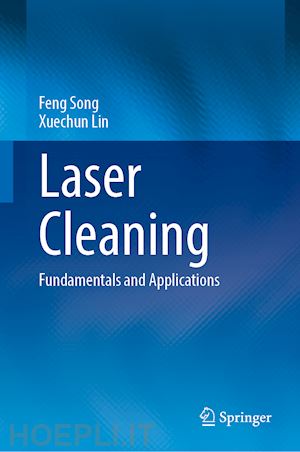
Questo prodotto usufruisce delle SPEDIZIONI GRATIS
selezionando l'opzione Corriere Veloce in fase di ordine.
Pagabile anche con Carta della cultura giovani e del merito, 18App Bonus Cultura e Carta del Docente
This book highlights a comprehensive summary of the latest advances in research and applications of laser cleaning. As an innovative way of surface treatment, laser cleaning has received increasing global attention in today's environmentally conscious world. Laser cleaning has gone through a long history from theories to technological developments, and to a wide spectrum of applications. The book first presents the fundamental physics of laser cleaning and demonstrates how the theories have guided the innovation of technology and applications. Following that, the new and most used equipment for laser cleaning has been introduced. Applications in electrics, paint removal, rust removal, the mold industry, cultural heritage protection, and other fields are summarized with plenty of examples and discussions.
The book is a valuable reference in laser cleaning for researchers who seek inspiration for their research, engineers who need specific information to guide their work, and students who must learn systematically with working examples.
Introduction.- Overview of Cleaning Technology.- Common Lasers in Laser Cleaning.- Physical Basis of Laser Cleaning.- Laser Cleaning Equipment.- Application of Laser in Cleaning Electronic Components.
Dr. Feng Song received his PhD degree from Tianjin University, China in 1995. He then did postdoctoral work in Nankai University (1995-1997) and the University of Arizona, the USA (2001~2002), and worked as a visiting professor in Moscow University, Russia (2004-2005) and the City University of Hong Kong (2008-2009), Hong Kong SAR, China. He is currently a professor at the School of Physical Sciences, Nankai University, China. His research interests include solid-state lasers and applications, fabrication and luminescence of rare earth doped materials, compact fiber lasers and amplifiers, broadband ASE light sources, emission enhancement by surface plasmon polariton, and nanostructure and the influence on the radiative and non-radiative decay. Dr. Song has over three decades of academic and industrial experience in photonic materials and devices, especially on laser cleaning. He also serves as the Executive member of the Optoelectronics Professional Committee of the Chinese Optical Society and the Deputy Director of the Tianjin Laser Technology Society (2012-2020), Vice Director and Secretary General of the Tianjin Physical Society, and Member of the Academic Committee of the National Solid-State Laser Technology Laboratory of China.
Dr. Xuechun Lin received his PhD from the Institute of Physics, Chinese Academy of Sciences (CAS) in 2004, and became the youngest full professor in the Institute of Semiconductors (IOS), CAS in 2007. He is currently the Director of All Solid-State Light Source Laboratory, IOS, CAS. For over two decades, he has devoted himself in the research and development of high-power all solid-state lasers and their applications. His research and inventions are listed as major achievements of the "11th Five-year Plan" by CAS and the Ministry of Science and Technology of China. He won the second prize of the National Technological Innovation Awards of China in 2017.











Il sito utilizza cookie ed altri strumenti di tracciamento che raccolgono informazioni dal dispositivo dell’utente. Oltre ai cookie tecnici ed analitici aggregati, strettamente necessari per il funzionamento di questo sito web, previo consenso dell’utente possono essere installati cookie di profilazione e marketing e cookie dei social media. Cliccando su “Accetto tutti i cookie” saranno attivate tutte le categorie di cookie. Per accettare solo deterninate categorie di cookie, cliccare invece su “Impostazioni cookie”. Chiudendo il banner o continuando a navigare saranno installati solo cookie tecnici. Per maggiori dettagli, consultare la Cookie Policy.